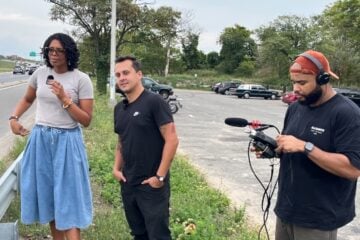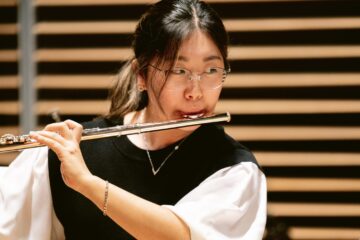With return of ‘Lost Notes,’ KCRW reinvests in limited-run podcasts

Provided by On Air Fest
"Lost Notes" co-hosts Novena Carmel, left, and Michael Barnes preview the first episode of the podcast's next season during a Nov. 1 event hosted by KCRW.
Most everyone knows “Tainted Love,” the chart-topping synth-pop hit from the early 1980s, but few know the song originated as the B-side of a single recorded in Los Angeles in 1965. The first episode of the new season of KCRW’s Lost Notes podcast could change that.
Released this month as a preview of what’s to come, it tells the story of Gloria Jones, a church-trained teenage vocalist turned R&B singer who had reservations about whether “Tainted Love” was an appropriate song for an aspiring young recording artist such as herself to sing. This little-known story from Los Angeles’ vibrant soul music scene is one of many that Lost Notes explores in its next season, slated to roll out in February.
Created and produced by Nick White and Myke Dodge Weiskopf, Lost Notes launched in the spring of 2018, releasing episodes sporadically. It has been mostly dormant since its 2020 season, which focused on 1980 as a year that redefined popular music. (“Bent by Nature,” a 2021 Lost Notes miniseries that took a deep dive into KCRW’s own history, revisited the legacy of the late KCRW DJ Deirdre O’Donoghue.)
Now KCRW’s Podcast Audience Lab is reinvigorating Lost Notes as it aims to make a big step into podcasting under Gina Delvac, a former Spotify executive who joined the Santa Monica station last year.
Reinvestment in the classics
Delvac sees podcasting as a medium that KCRW “helped create and develop,” she says. Coming into the job, she “really wanted to think about what styles of storytelling and experiences that we do uniquely well, and what our audience was already in love with.”

To Weiskopf, KCRW’s senior producer of music, Lost Notes fits particularly well into that framework because it bridges KCRW’s status as an incubator for music tastemakers and great reporting. “We can have the passion and appreciation for music in all of its multiplicities and all of its forms,” he says, “and we can also transform your understanding of what that music is, what it represents, where it comes from and how it reflects the city back to itself.”
“Lost Notes was already positioned in this nice spot amidst things that podcast audiences love, like hidden histories, learning more about things that you already care deeply about,” Delvac says. With compelling hosts that build connections with listeners, it can also “create passion … about a subject that you never thought you might care for but are excited to learn about.”
Past seasons have looked beyond L.A. for stories, and the fourth season marks a shift. It explores the city’s often underappreciated contributions to the world of soul music. Artists featured in the new episodes aren’t solely associated with Los Angeles, but the stories Lost Notes aims to tell are. Weiskopf developed the new framework as producer of the new season.
An episode about Fela Kuti, for instance, relays the story of how the legendary Nigerian musician ran out of money on a U.S. tour and ended up stranded in L.A. with an expired visa. While hiding out with his band, listening to records and going to shows, Kuti started to create Afrobeat, a style of music that blends West African music with American jazz and funk. “One could speculate,” Weiskopf says, “that he might never have arrived at the Afrobeat that we all know him for had he not been here, in that time and in this place.”
“In Lost Notes, L.A. is the prismatic reflection point,” Weiskopf continues. “An artist might be on one side of their career, their vision, their sensibility and their perception of themselves. And then they come to L.A. and, because of their time here, you see this very different artist and this very different person.”
L.A. soul
The idea for the new season came during a particularly nasty bout of COVID, Weiskopf says. While he was laid up, he started poking around online looking at L.A. soul 7-inches. After noticing that addresses for a lot of the recording labels seemed close to each other, he mapped out the locations. “These were mostly really tiny labels. … Once I started mapping them and looking at the dates, I realized that there was … one block, where there were five or six record labels in ’61, ’62, ’63,” he says. “I looked into it some more, and I ended up with over 100 record labels within about five miles of each other.”
“I started wondering what was going on in this time period where there was suddenly this massive wave, this uprising of entrepreneurship and creative acts in these neighborhoods where there was this very common surge of self-expression,” Weiskopf continues. The people who started the labels weren’t all millionaires or from privileged backgrounds. “They didn’t necessarily have capital. But they did have an urgency to put their message out there, even if it was through a two-and-a-half-minute pop song.”
A self-identified “white dude from the Midwest,” Weiskopf wanted hosts for the new season who knew the music and its greater context in the history and ever-changing landscape of L.A. He found what he was looking for in Morning Becomes Eclectic co-host Novena Carmel and Michael Barnes, a Cal State Long Beach professor who has produced and hosted shows at KCRW and many community stations, including WORT in Madison, Wis., and Pacifica’s KPFA in Los Angeles.

“Digging into the past and making connections between that time and and now … is something that’s a core aspect of my musical sensibility,” Barnes says. “Any radio show I’ve ever done has been about mixing a variety of genres or bringing up older things and making connections to newer things,” like how African cultures or music connects to dance music coming out of Chicago. “Those are the kinds of stories that I’m interested in telling.”
Future episodes of Lost Notes, Barnes says, will focus on topics like the history of “Viva Tirado,” a song made popular in the ’70s by El Chicano and sampled more recently by Kid Frost, and the career of the Mizell Brothers, a production duo who worked out of the Hollywood Hills in the ‘70s and produced in influential run of albums for Blue Note Records.
“You don’t really think of Los Angeles as a soul town,” Barnes says, “but a lot of amazing soul music happened here. With soul music, in particular, the migration of black folks to Los Angeles in the late ’40s and ’50s and the rise of Central Avenue created a space that was unique in some respects on the west coast.”
Future ‘Notes’
With three months to go before full release of the new season, the podcast team is already thinking about where Lost Notes could go next. Plans to broadcast the episodes are also in the works.
“Our greatest hope is that this season will be a big success and that, shortly after the rest of it airs, you’ll be hearing more from Lost Sounds,” Delvac says. “I’m already thinking about more subjects that we could potentially run next year.”
Weiskopf says he’s taking some time off for “a nap” after this season, though he’s open to KCRW bringing in “new blood.”
“We all know that there’s … general pessimism about the limited series as a business-viable form,” says Delvac. “But on the other hand, we know that it’s one of the most compelling styles of audio production out there, and it’s what draws new audiences in. I don’t think we can give up on the limited series.”
“One of the central points in our mission at KCRW is to uphold creativity in our staff and with our audiences,” Delvac continues. “Taking the chance to make something that would be highly creative — when others are running away because business says it’s more challenging — felt like the kind of thing that we’re uniquely positioned to do.”
To continue producing Lost Notes and other limited series, Delvac created a larger upfront production budget with the aim of being able to roll out seasons in relatively short succession, she says.
“Once we build a relationship with an audience, we need time for it to cook — and we need to continue to offer them beautiful and lovely things,” she explains. She was pleasantly surprised to see robust listenership numbers for Lost Notes between seasons, but the podcast only draws about a tenth as many listeners during those off-times.
“KCRW is not going to stop making podcasts,” Delvac says. “I’m very, very focused on what the sustainable path forward is, though, so you’re probably not going to see six or eight different Lost Notes–level projects from us.”
“We can’t invest at the scale of a for-profit media company,” she adds, “but we’re going to continue to drive creative excellence where we can build extremely welcoming experiences that drive loyalty in person, in our digital content, on our broadcast airwaves and on our social pages.”
“People have long turned to KCRW for discovery and creative distinction, and that’s the reputation I’m looking to continue to build.”
Correction: An earlier version of this article incorrectly referred to KCRW’s Podcast Audio Lab. It is the Podcast Audience Lab.






